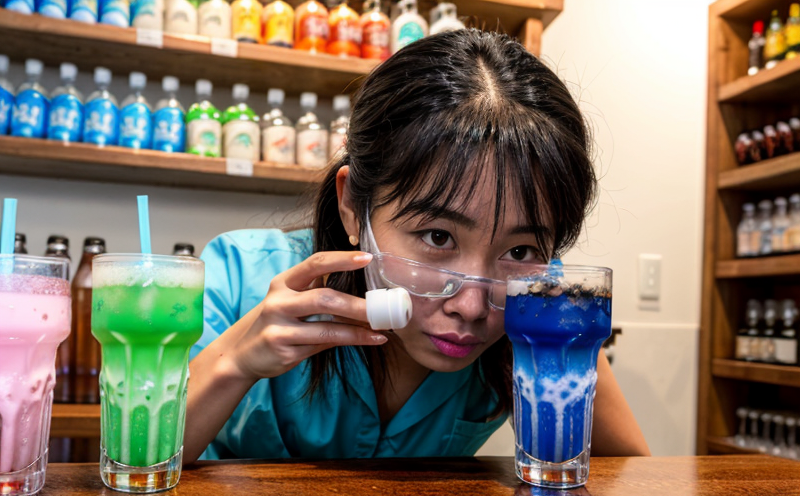EN ISO 21871 Detection of STEC in Beverage Products
The STEC testing method outlined in ISO 21871 is a critical tool for the beverage industry, ensuring product safety and compliance with international standards. This method provides a robust framework for detecting potentially harmful bacteria in various beverage products, including juices, milk, and other non-alcoholic beverages.
The testing process involves several key steps: sample collection, nucleic acid extraction, amplification using real-time polymerase chain reaction (PCR), and detection through fluorescence monitoring. This method is particularly sensitive and specific for identifying STEC strains that produce Shiga-like toxins, which can cause severe illness in humans.
The ISO 21871 standard emphasizes the importance of quality control measures throughout the testing process to ensure accurate and reliable results. Laboratories must adhere strictly to the prescribed protocols to minimize contamination risks and maintain consistent performance. This includes using validated reagents, calibrated instruments, and trained personnel.
Compliance with this standard is not just a regulatory requirement but also a commitment to public health and consumer safety. Beverage manufacturers and suppliers can leverage ISO 21871 to enhance their quality management systems and build trust with consumers by demonstrating their dedication to product safety.
The method's sensitivity allows for early detection of STEC in raw materials or finished products, enabling corrective actions before the products reach the market. This proactive approach helps prevent outbreaks and protects brand reputation.
In addition to its role in quality control, ISO 21871 plays a vital part in research and development (R&D) efforts aimed at improving beverage safety. The standard provides a consistent framework for comparing results across different laboratories, facilitating collaborative studies and standardization of testing protocols.
The widespread adoption of this method underscores its importance in the global beverage industry. Laboratories accredited to perform ISO 21871 tests are recognized as providing high-quality services that meet international standards. This accreditation enhances their credibility among clients and stakeholders.
For quality managers, compliance officers, R&D engineers, and procurement professionals involved in beverage production, understanding and implementing ISO 21871 is essential for maintaining product safety and ensuring regulatory compliance. By adhering to this standard, these professionals contribute significantly to safeguarding public health.
Industry Applications
The application of ISO 21871 extends beyond mere compliance—it supports a wide array of industry applications. Quality managers can use the standard to ensure consistent product quality and safety across different production batches. Compliance officers benefit from standardized procedures that simplify regulatory audits and inspections.
- Raw Material Inspection: Ensures that incoming raw materials do not contain harmful STEC strains, thereby preventing contamination risks early in the production process.
- Product Testing: Provides a reliable method for detecting STEC during quality assurance checks and final product testing.
- R&D Support: Facilitates research into new beverage formulations, ensuring that any potential sources of STEC are identified early in development stages.
- Supply Chain Management: Helps manufacturers track and verify the safety of ingredients sourced from various suppliers, ensuring consistent compliance across diverse supply chains.
- Outbreak Investigation: Supports epidemiological studies by providing accurate data on STEC presence in different beverage products during outbreak investigations.
- Sustainability Initiatives: Encourages sustainable practices by identifying and eliminating potential sources of contamination, thereby reducing waste and enhancing resource efficiency.
The versatility of ISO 21871 makes it an indispensable tool for addressing various challenges in the beverage industry. By integrating this standard into their operations, companies can achieve a balance between regulatory compliance, product safety, and sustainable practices.
International Acceptance and Recognition
The international acceptance of ISO 21871 is rooted in its rigorous scientific foundation and widespread use across the beverage industry. The standard has been adopted by numerous countries, including those that are members of the International Organization for Standardization (ISO). This broad recognition underscores its reliability and effectiveness.
Many global health organizations recommend or require compliance with ISO 21871 as part of their guidelines for food safety. In regions where regulatory frameworks differ, laboratories accredited to perform these tests often enjoy greater credibility among clients and stakeholders. This accreditation is particularly valuable in international trade scenarios, where consistent quality standards are essential.
The adoption of ISO 21871 also fosters collaboration between different segments of the industry. Laboratories, manufacturers, suppliers, and regulatory bodies can work together more effectively when they share a common framework for testing. This collaborative approach enhances overall product safety and supports the development of best practices in beverage microbiology.
The standard's acceptance is not limited to specific regions or industries but extends across diverse sectors globally. This universal appeal makes ISO 21871 an integral part of modern quality management systems, ensuring that all stakeholders can contribute effectively to maintaining high standards of product safety and compliance.





